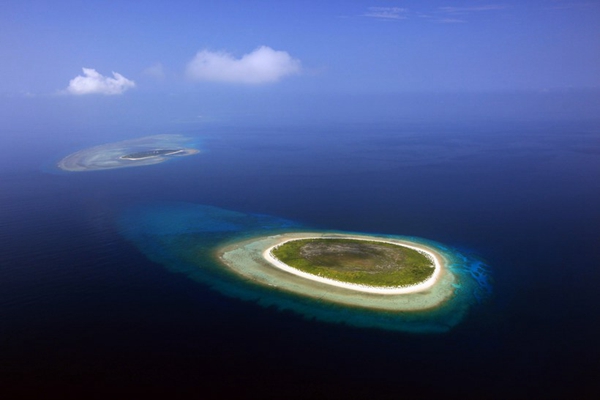


(File photo)
China on Tuesday reaffirmed its right to self-defense and refuted U.S. accusation as "hyping with ulterior motives" after a U.S. think tank report said China might be installing radar on islands in the South China Sea.
The deployment of defense facilities is within China's right to self-defense granted by international law, which is fully legitimate, said a press release from the Ministry of National Defense.
The ministry's remarks came after a report from the Washington-based Center for Strategic and International Studies (CSIS) on Monday saying satellite images showed China might be installing a radar system on the Nansha Islands. The radar system would significantly bolster China's ability to monitor surface and air traffic across the southern portion of the South China Sea, the report said.
The ministry said the facilities including navigation and meteorological equipment are mainly for civil usage to provide public good for the international community.
The ministry accused the U.S., which strengthened military deployment in the South China Sea, sent military vessels or planes to the region, and gathered allies to conduct joint drills or joint cruise with strong pertinence, of "being the root" of militarization in the South China Sea.
"Someone turned a blind eye to the U.S. behavior, but criticized China's legitimate islands construction over and over again. It is deliberately stirring up trouble with ulterior motives and exaggerating the tension," the press release said.
In an interview with Global Times, China's military expert Zhang Junshe said that even if the U.S. report is real, it is reasonable for China to build defensive facilities on its territory. Zhang stated that to conduct territorial defense China should be capable to undertake detection and surveillance and to be aware of foreign threat. Furthermore, deployment of early warning maritime or air surveillance radars will not impose any threat to navigation and aviation, according to Zhang.
Zhang also stated that the U.S. put a blind eye on countries like the Philippines who deployed missiles and antiaircraft guns. He also criticized American double-standard attitude on defensive facilities deployment for the country itself still arranges lots of radar on Guam, Hawaii and even Okinawa base.
Ni Feng, a U.S. issue expert, told the Global Times that deployment of defensive facilities in the South China Sea is closely related to American actions. The U.S. always conducts close-up reconnaissance against China, especially after China began to construct relevant reefs and islands in that region, and the U.S. violates China's national interests claiming freedom of navigation. China's reaction has little difference with the American one on essence.
An anonymous researcher told the Global Times that the U.S. has no choice but to exaggerate threats from China in order to have an excuse to put a finger in the South China Sea issue in aspect of geostrategy as they break the promise that they "will not choose any side."
Ni told the Global Times that although strategic competition between the two countries is increasingly fierce, the two countries have a consensus that they will not confront each other.
 2016 Miss Chinatown USA pageant held in San Francisco
2016 Miss Chinatown USA pageant held in San Francisco Ancient pagodas across China
Ancient pagodas across China Beijing Film Academy starts 2016 entrance exam
Beijing Film Academy starts 2016 entrance exam Wedding dress show up in the air
Wedding dress show up in the air Have you ever taken these beautiful subways in China?
Have you ever taken these beautiful subways in China? Russian photographer brings fairytales to life
Russian photographer brings fairytales to life Chinese beauties, foreign models meet in Chengdu
Chinese beauties, foreign models meet in Chengdu Awesome! Aerial pictures taken on J-11 fighter
Awesome! Aerial pictures taken on J-11 fighter A foreign girl explains what China should be proud of
A foreign girl explains what China should be proud of Top 20 hottest women in the world in 2014
Top 20 hottest women in the world in 2014 Top 10 hardest languages to learn
Top 10 hardest languages to learn 10 Chinese female stars with most beautiful faces
10 Chinese female stars with most beautiful faces China’s Top 10 Unique Bridges, Highways and Roads
China’s Top 10 Unique Bridges, Highways and Roads US push leaves China no wiggle room
US push leaves China no wiggle room Don’t let adolescent anger take terrible turn
Don’t let adolescent anger take terrible turn The debate about squatting VS sitting rages on
The debate about squatting VS sitting rages on Family pressure to have second children drives mothers to drop careers
Family pressure to have second children drives mothers to drop careersDay|Week